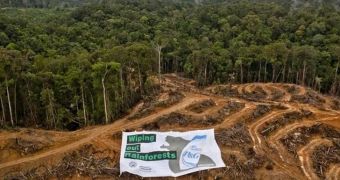If at first you don't succeed, try, try again, appear to be the words of wisdom that Greenpeace activists let guide their actions.
Thus, despite the fact that other manifestations of this kind have failed to get P&G to change its mind about the way it does business, the organization has recently staged yet another protest against the company.
This time, Greenpeace members and supporters visited a freshly destroyed patch of rainforest in Central Kalimantan, Indonesia.
While there, they took pictures of the area and shared them with the world in an attempt to twist the company's arm into putting its use of unsustainable palm oil behind it.
Mongabay tells us that this latest anti-P&G protest in Indonesia was held this past Monday.
According to the environmentalists, the area where they gathered no longer had any trees on it due to the fact that it had been cleared in order to accommodate for a new palm oil plantation.
Truth be told, P&G cannot directly be blamed for the destruction of this area of rainforest. One of its suppliers, on the other hand, can and should be held responsible.
Information shared with the public by Greenpeace says that the cleared area where the protest took place is run by a company dubbed Multi Persada Gatramegah.
This company is a subsidiary of Musim Mas, which happens to be a P&G supplier and to also represent about 10% of the global palm oil industry.
The environmentalists argue that, by continuing to work with Musim Mas and its subsidiaries, P&G is doing no more and no less than supporting the practice of destroying rainforests in order to have them replaced by palm oil plantations.
In doing so, the company is helping bring already endangered species such as tigers and orangutans closer to extinction, Greenpeace maintains.
The organization argues that, should companies such as P&G quit buying palm oil linked to forest destruction, suppliers like Musim Mas would have no choice but improve on their ecological footprint or risk going out of business.
“P&G must join other companies like Nestle, Unilever, Ferrero, L’Oreal and now Mars which have committed to No Deforestation policies,” Greenpeace urges.
“It's time P&G finally becomes proud sponsors of rainforests and commits to No Deforestation,” it adds.
In related news, it must be said that, although P&G is playing hard to get, Mars, Inc., the maker of Snickers, Twix, and M&M's has promised that, by 2015, its products will all be deforestation-free.

 14 DAY TRIAL //
14 DAY TRIAL //